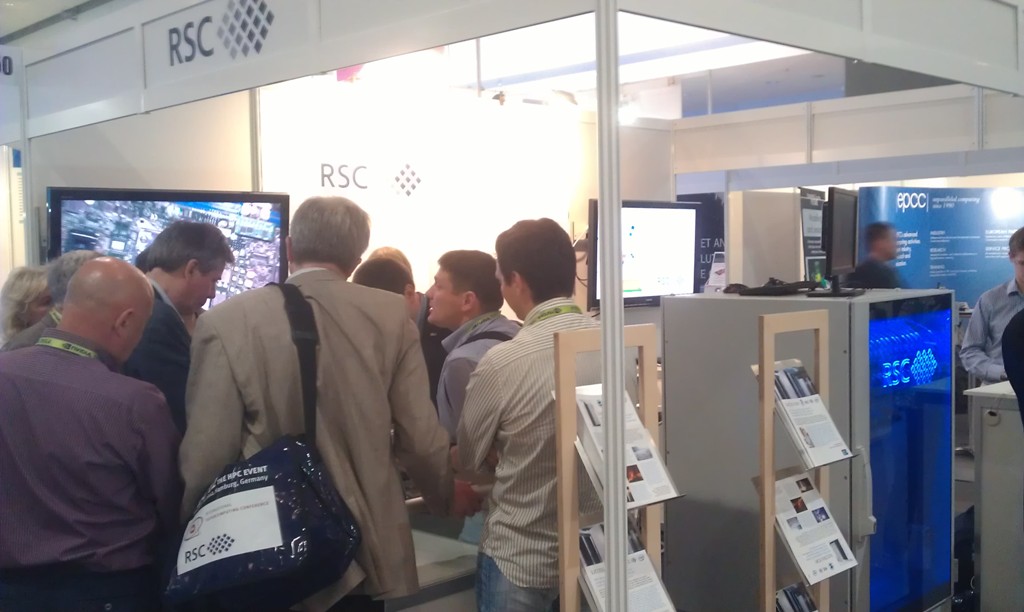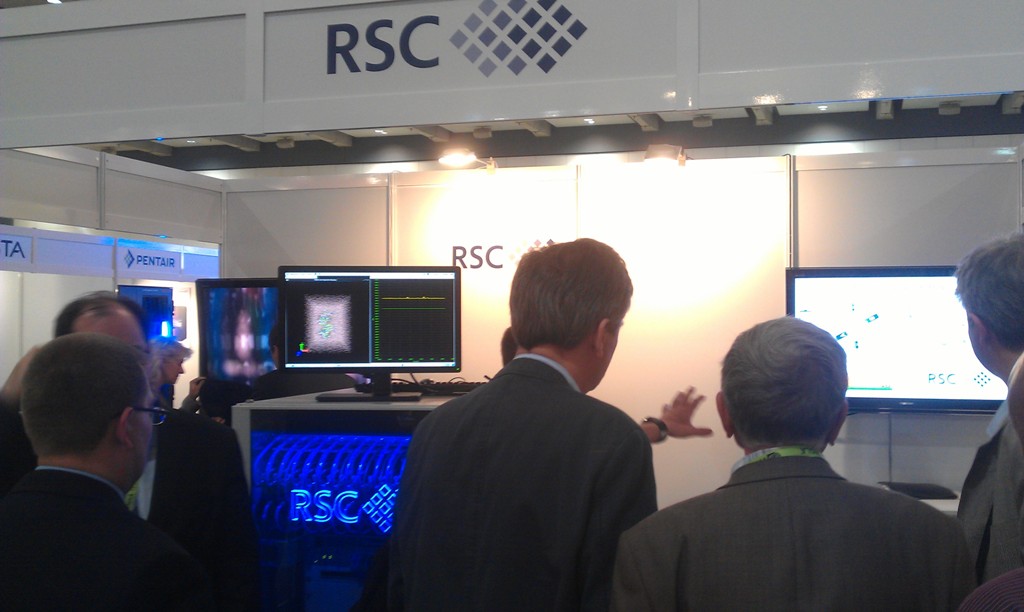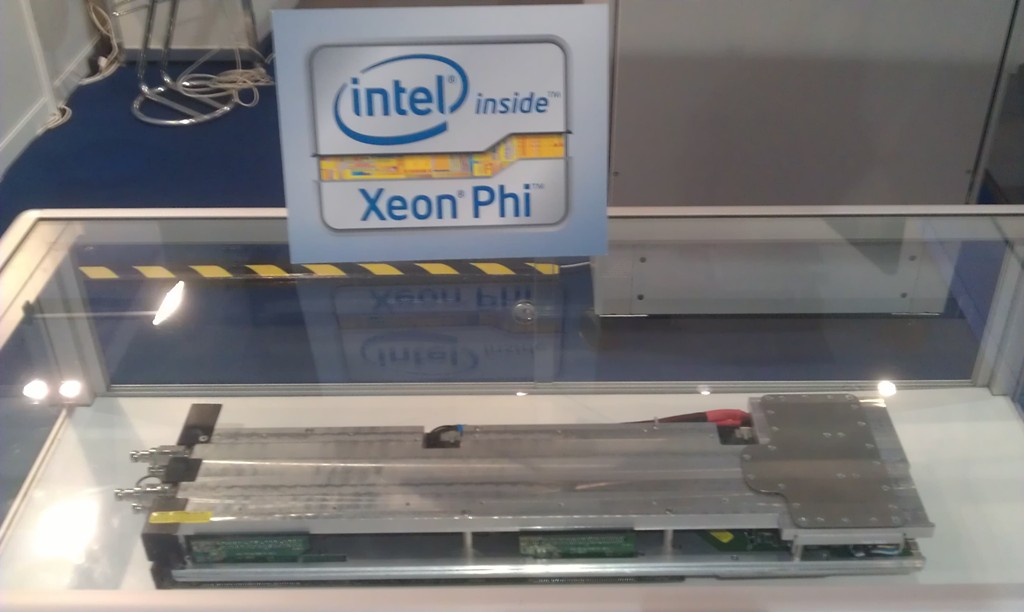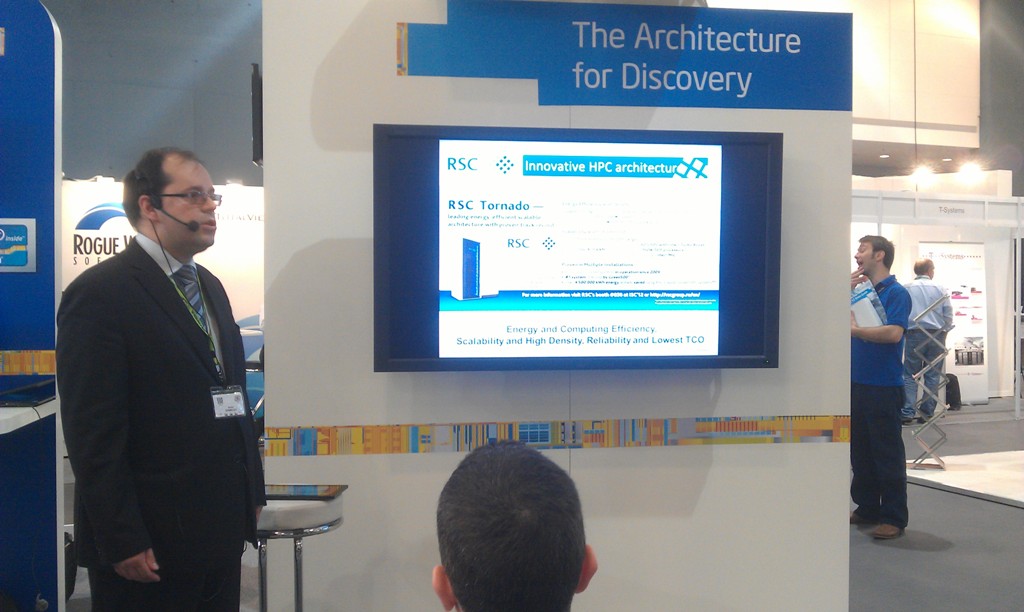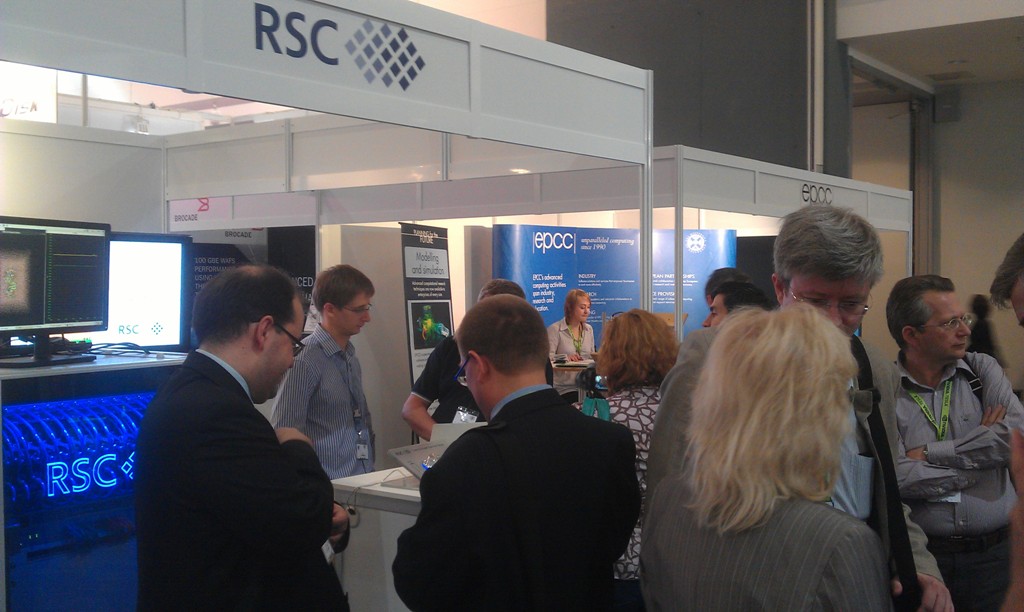Hamburg (Germany), International Supercomputing Conference. June 19, 2012. — As a part of its participation in a leading International Supercomputing Conference (ISC’12), which is held on June 18-20 in Hamburg (Germany), RSC Group (booth #850, Silver Sponsor) is showcasing a number of its next-generation HPC solutions based on RSC Tornado innovative architecture, which implements highly efficient liquid cooling for standard and widely available server boards (provided by various manufacturers) and high-performance Intel® Xeon® processors initially created for traditional systems with air-cooled electronic parts. It’s important to note that RSC Tornado architecture was first demonstrated at ISC’11 a year ago. Since then this architecture has become a basis for new energy efficient solutions implemented in data centers and supercomputing solutions.
A new product line-up based on RSC Tornado architecture
RSC Group is showcasing at ISC’12 a full product line-up of high-performance RSC Tornado architecture based solutions with high computing density intended to solve various clients’ tasks and used in the process of creating energy efficient and compact datacenters: RSC DCmicro (16 to 64 nodes), RSC DCmini (64 to 256 nodes) and RSC Data Center (more than 2 racks up to dozens of PFLOPS).
RSC DСmicro and RSC DCmini are de facto full-fledged super compact data centers with all the necessary infrastructure components, such as:
- Up to 2 computing racks;
- Cooling subsystem;
- Power supply subsystem;
- Communication subsystem;
- Management and monitoring.
Among unique features of RSC Tornado and solutions based on the architecture there are the following:
• 128 servers in a standard 42U 80х80 cm rack;
• Fully independent blade server;
• Record-breaking energy and power efficiency. The system has an industry-record Power Usage Effectiveness (PUE) of less than 1.06 (this is the ratio of total power consumption vs. power consumption of electronic components). This means that maximum 5.7% of the consumed power will be used for cooling of the system;
• Record-breaking computing effectiveness ratio — more than 92% for the latest Intel Xeon E5-2690 processors in LINPACK benchmark (Intel® Turbo Boost Technology is always engaged, which provides for clock speed gain of up to 400 MHz);
• Less than 65kW of electric power consumption for RSC DCmini in 1 rack;
• Possibility to use Intel's best-performing server processors with heat dissipation of 135W, e.g. Intel® Xeon® E5-2690 Processor (2.9 GHz, 8 cores);
• High peak performance up to 47.5 TFLOPS per rack based on Intel x86 architecture with AVX Instruction Set;
• High density — 74 TFLOPS per sq. m.;
• High scalability — up to PFLOPS level (dozens of racks);
• Total Cost of Ownership – operating cost reduction by 60 percent (energy cost saving due to RSC solution operation);
• Compute Density – multifold datacenter floor area reduction;
• PCIe x16 card extension support.
Additionally, RSC Group specialists implemented a fully integrated software stack for High Performance Computing (НРС).
The efficiency of RSC Tornado based solutions is proven by real-life projects
RSC DCmini systems were already deployed in a number of projects in Russia. For example, in the Federal Service for Hydrometeorology and Environmental Monitoring (Roshydromet) and Moscow Institute of Physics and Technology (MIPT) at I-SCALARE supercomputer technology laboratory for biomedicine, pharmacology and small-scale structures (Intel supercomputer applications laboratory for advanced research).
RSC Data Center class SKIF-Aurora SUSU supercomputer consisting of over 500 servers with a total peak performance of 117 TFLOPS was installed by RSC Group in South Ural State University, Chelyabinsk. This system developed and manufactured by RSC Group occupies the 4th position in Top50 rating of most powerful computers in Russia and CIS (as of March 2012), and is the most energy efficient Russian supercomputer included in Green500 world rating.
Liquid cooling already helped save 4.5 million kWh of energy
According to RSC Group specialists' estimates, since the first liquid cooling computing cluster has started operation in SUSU in 2009 and after the implementation of several other key supercomputing projects in Roshydromet (35 TFLOPS) and MIPT (41.5 TFLOPS) the total energy savings due to the use of liquid cooling reached 4.5 million kWh.
Support of new Intel® Xeon® E5-2600 processor family and Intel® server boards
RSC Group is demonstrating at ISC’12 a latest update of RSC Tornado architecture, which supported new Intel® Xeon® E5-2600 server processors even before their official launch. Implemented in March 2012, Roshydromet and MIPT cluster systems were the first projects in Russia and CIS countries based on the new Intel® Xeon® processor family and Intel® S2600JF server boards.
It is important to note that during Intel Platinum Summit held in London (UK) recently RSC Group won a special award “For implementing the 1st liquid-cooled Intel server boards based HPC solution in EMEA”, which distinguished the company’s success and innovative approach in cooperation with Intel Corporation.
Future support for the Intel® Xeon® Phi™ co-processor family
RSC Group specialists plan to develop and implement own solution based on upcoming Intel® Xeon® Phi™ co-processor family. As it was highlighted at ISC’12 a new RSC’s product design will support Intel® Xeon® Phi™ coprocessor family consisting of over 50 cores.
Flexible power management for geographically distributed datacenters
RSC Group is also showcasing its flexible power management system for geographically distributed datacenters as a newly developed additional functionality for RSC Tornado based solutions. This approach allows to optimize power consumption of a distributed datacenter by dynamically setting energy consumption limits both for the datacenter’s separate computing elements such as a specific server and for the whole datacenter in accordance with a selected management policy and the existing requirements for computing resources. This system is based on Intel® Node Manager Technology, which allows distributing energy budget among each computing node, as well as on an adaptive power management model for the whole computing cluster.
This solution will help RSC clients and users save even more energy by redistributing workloads during peak hours. In practice, this approach can provide for up to 20 percent increase of computing power at a datacenter within the existing external power supply limitations.
“Since the inception of our company three years ago we’ve opted for innovation, which allows us creating the most advanced supercomputing systems to help our clients solve real-life tasks more effectively. The unique nature of advanced solutions demonstrated by RSC at ISC’12 once again prove that we’ve chosen the right course”, – said Alexey Shmelev, Chief Operational Officer at RSC Group.

